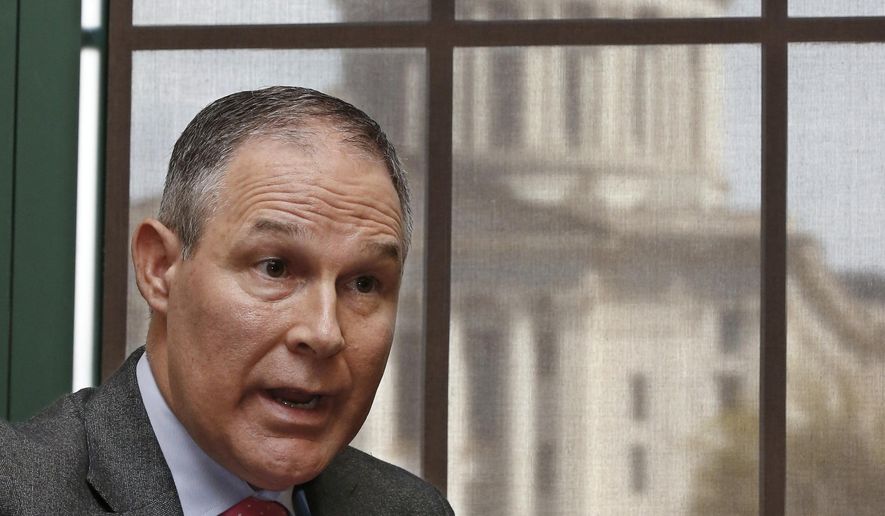OPINION:
Scott Pruitt, the attorney general of Oklahoma and Donald Trump’s nominee for director of the U.S. Environmental Protection Agency, calls himself “a national leader in the cause to restore the proper balance of power between the states and the federal government.” He established a first-ever Federalism Unit in the Office of Solicitor General in Oklahoma to combat “unwarranted regulation and overreach” by the federal government. Federalism is the new shorthand for “states’ rights.”
That’s what commended him to the president-elect, because nowhere else in the vast federal bureaucracy is overreach so out of control as in the Environmental Protection Agency. Nowhere else is the panic in the Washington swamp so pervasive. “At the risk of being dramatic,” says Dan Pfeiffer, a onetime senior adviser to President Obama and a man willing to take the risk, “Scott Pruitt at EPA is an existential threat to the planet.”
Mr. Pruitt and his fellow state attorneys general, who have gone to court to stall the EPA’s regulatory excesses, have rejected the childish slander that because they question the EPA’s excesses they’re for “dirty air and dirty water.” This is odd, because the attorneys general drink the water and breathe the air everybody else does, and have never shown a taste for suicide.
But what they actually oppose is the bureaucracy at the EPA doing things they know they have no legal or statutory mandate from Congress to do. They think the ends, sometimes good and sometimes not so good, justify the means. The left tried that argument, with all the accompanying pressure they could muster, to harass the Electoral College to abandon its moral and legal obligation to vote for the man who fairly carried their states.
Mr. Pruitt earned the enmity of the radicals by organizing the coalition of state attorneys general to block the EPA’s Clean Power Plan, the Obama administration’s costly and cumbersome policy to reduce the greenhouse-gas emissions, so called, in the electricity sector, and to block the EPA’s scheme to curtail the emissions of methane in oil and gas production.
“What concerns the states is the process, the procedures, the authority that the EPA is exerting, that we think is entirely inconsistent with its constitutional and statutory authority,” he told The Washington Post. “The overreach is that the statutes do not permit [EPA officials] to act in the way they do.”
The 1970 Clean Air Act, under the auspices of which the EPA claims to be acting, is long overdue for an overhaul by Congress. If Congress wants the EPA to have the authority it clearly covets, it could expressly and explicitly say so.
Contrary to the hysteria on the left, Mr. Pruitt, who is from a major oil- and natural gas-producing state, is not pro-pollution. “Some people believe we don’t need an EPA, that they don’t have any role at all,” he told an interviewer for National Public Radio three years ago. “I’m not one of those folks. I think the EPA can serve — and has served, historically — a very valuable purpose.” But he wants to hold the EPA to do the right thing in the right way.
That’s a big difference, one lost on Gina McCarthy, the current EPA administrator whom Mr. Pruitt is poised to replace. She promised after the election to make the transition as difficult for her successor as she could, reminding her agency: “We’re running — not walking — through the finish line of President Obama’s presidency.” But in less than a month there will be another finish line.




Please read our comment policy before commenting.